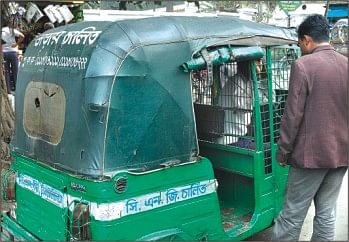<i>Plainclothes cops hound unruly cab drivers</i>

Photo: Anisur Rahman
Traffic police officials have been working undercover in their renewed effort to ease the chaos and misconduct that gripped the city's taxicab and autorickshaw service sector.
After being spectators for years, the plainclothes traffic officials are finally conducting operations at the city points where taxicab and three-wheeler drivers refuse to go to desired destinations of the passengers or demand extortionate fares from them.
Around 25 traffic officials from four different zones of Dhaka Metropolitan Police (DMP) have already hit the streets to ensure that the drivers of taxicabs or CNG three-wheelers conform to the policy set by the government.
Several teams of roughly six traffic officials are out on the streets to apprehend violators of the taxi service rules.
The vigilance team will take legal action against taxi or autorickshaw drivers who refuse to go to the passengers' desired destinations or harass them by turning the meters off and demanding exorbitant amounts of money from them, said sources at the traffic wing of the DMP.
"The official will report the vehicle [driven by the offender] to the control room and hold it until a sergeant gets there and take legal action against the offender," said Jashimuddin, joint commissioner of DMP traffic wing.
They may approach the vehicles in the guise of passengers to check whether they are abiding by the meter policies, said the sources adding that four such teams are filing around 100 cases against violators everyday.
The main objective of this initiative is to reduce public sufferings caused by the unruly cab drivers, said a DMP official.
This initiative, launched earlier this month, will also enable the traffic officials get a grasp of the real situation firsthand and record on-the-spot versions of the dispute from both the passenger and the driver for future reference, the traffic department sources said adding that the drive will go on until the situation is completely under control.
City commuters, however, expressed their doubts over the effectiveness of the new effort of he traffic department.
Nurul Islam, an undergraduate student from Uttara, said, "I don't really understand the use of the this new idea. Though they [traffic officials] are always there on the streets anyways, they stand there as mere onlookers while we have to practically beg the autorickshaw and taxicab drivers to take us on."
Despite all the scepticism, the traffic police authorities are optimistic that the new step will help diminish some of the unruly behaviours practised by the cab drivers.
"The situation has already improved since we started this new mission. Already a lot of taxicab and CNG autorickshaw drivers are more careful about their conduct," said an official concerned at the traffic department of DMP.
Moving from one place to another within the city is getting increasingly difficult and costly day by day for thousands of helpless commuters as autorickshaw and cab drivers are holding the commuters hostage for extracting extortionate fares.
The situation turned worse after most thoroughfares of the city were declared off limits to rickshaws -- a favourite mode of transport of the commuters. The commuters thus are left without any choice but to virtually plead the cab drivers to take them to their destinations.
Furthermore, the punitive measures against the violators of traffic rules are so insignificant that this punishment can hardly make the offenders abide by the law, said the joint commissioner of traffic wing. The fine is so negligible that the drivers become all the more arrogant having paid the fine once or twice, he added.
"There are no specific laws against the meter rules violations. Therefore, we have to punish the offenders by applying existing traffic regulations," said an official concerned at the traffic department of DMP. "The offenders become more acquainted with the penalties and all the more arrogant after having paid the fine multiple times," he added.
As per existing rules, police can fine an offender of traffic rules between Tk 50 and Tk 500, which is so lenient in today's context that it fails to deter them from committing the same crime again, he said adding that even if the police file cases against the offenders, they get immediate bail.
Jashimuddin, joint commissioner of traffic, said the new effort of the traffic department would reduce misconduct in the public transportation sector to some extent.
"Autorickshaw and taxicab drivers are already more careful about demanding exorbitant fares," he claimed.
"We will continue the first-hand monitoring until the problem is completely solved. We also welcome feedbacks and suggestions from everyone on how the situation could be improved further," he added.

 For all latest news, follow The Daily Star's Google News channel.
For all latest news, follow The Daily Star's Google News channel. 



Comments